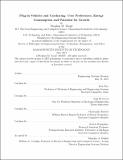Plug-in vehicles and carsharing : user preferences, energy consumption and potential for growth
Author(s)
Zoepf, Stephen M
DownloadFull printable version (9.786Mb)
Other Contributors
Massachusetts Institute of Technology. Technology, Management, and Policy Program.
Advisor
John Heywood.
Terms of use
Metadata
Show full item recordAbstract
Plug-in Electric Vehicles (PEVs) are seen as a key pathway to reduce fuel consumption and greenhouse gas emissions in transportation, yet their sales are under 1% of new cars despite large incentives. Carsharing, a market where consumers rent vehicles for short durations, is a low-risk way for consumers to use Plug-In Electric Vehicles for their travel needs without a large financial commitment. However, deployment of PEVs in carsharing depends on three key factors: (1) consumer acceptance of PEVs for rental trips, (2) the ability of carsharing providers to manage technical limitations of PEVs, and (3) that real-world energy consumption of PEVs meets expectations. To explore the feasibility of PEV deployment in carsharing, this dissertation incorporates a Mixed-Integer Programming and simulation of the assignment of trips and vehicles, and a Hybrid Choice Model of carsharing user preferences. This dissertation's primary contributions consist of the combination of Hybrid Choice Models with a Structural Topic Model to incorporate respondent comments, a two-level representation of the assignment problem faced by carsharing providers in allocating trips to vehicles and locating vehicles, a case study of PEV deployment in Boston, and analysis of real-world energy consumption of two fleets of PEVs. Results suggest that a large fraction of round-trip carsharing fleets could be converted to PEVs, simultaneously increasing profitability and reducing gasoline consumption, and some benefits can be captured using simple heuristics. However, current user attitudes towards PEVs in carsharing vary widely, and while carsharing exposes many users to hybrids, few have tried PEVs.
Description
Thesis: Ph. D. in Technology, Management and Policy, Massachusetts Institute of Technology, Engineering Systems Division, Technology, Management, and Policy Program, 2015. Cataloged from PDF version of thesis. Includes bibliographical references (pages 187-195).
Date issued
2015Department
Massachusetts Institute of Technology. Engineering Systems Division; Technology and Policy ProgramPublisher
Massachusetts Institute of Technology
Keywords
Engineering Systems Division., Technology, Management, and Policy Program.